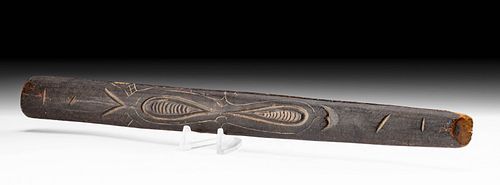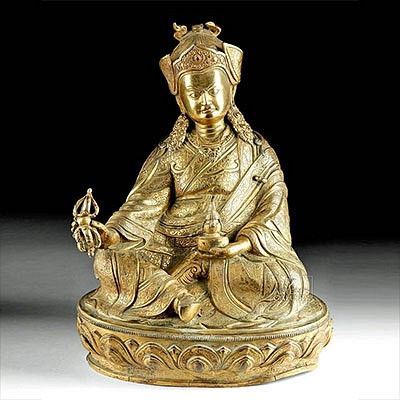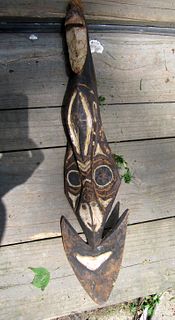19thC. Japanese Edo Wood Ikupasuy / Mustache Lifter
Lot 47b
About Seller
Artemis Fine Arts
686 S Taylor Ave, Ste 106
Louisville, CO 80027
United States
Selling antiquities, ancient and ethnographic art online since 1993, Artemis Gallery specializes in Classical Antiquities (Egyptian, Greek, Roman, Near Eastern), Asian, Pre-Columbian, African / Tribal / Oceanographic art. Our extensive inventory includes pottery, stone, metal, wood, glass and textil...Read more
Categories
Estimate:
$800 - $1,200
Absentee vs Live bid
Two ways to bid:
- Leave a max absentee bid and the platform will bid on your behalf up to your maximum bid during the live auction.
- Bid live during the auction and your bids will be submitted real-time to the auctioneer.
Bid Increments
| Price | Bid Increment |
|---|---|
| $0 | $25 |
| $300 | $50 |
| $1,000 | $100 |
| $2,000 | $250 |
| $5,000 | $500 |
| $10,000 | $1,000 |
| $20,000 | $2,500 |
| $50,000 | $5,000 |
| $100,000 | $10,000 |
| $200,000 | $20,000 |
About Auction
By Artemis Fine Arts
Mar 11, 2021
Set Reminder
2021-03-11 12:00:00
2021-03-11 12:00:00
America/New_York
Bidsquare
Bidsquare : Art of Asia | Antiquity to Present
https://www.bidsquare.com/auctions/artemis-gallery/art-of-asia-antiquity-to-present-6497
Featuring antiquities, ancient and works of art ranging from the third millennium BCE to the present from China, Japan, South and Southeast Asia, and Korea. Including jades, bronzes, lacquer, textiles, paintings, prints, sculpture, ceramics, metalwork, and other art forms in other media. Artemis Fine Arts info@artemisfinearts.com
Featuring antiquities, ancient and works of art ranging from the third millennium BCE to the present from China, Japan, South and Southeast Asia, and Korea. Including jades, bronzes, lacquer, textiles, paintings, prints, sculpture, ceramics, metalwork, and other art forms in other media. Artemis Fine Arts info@artemisfinearts.com
- Lot Description
East Asia, Japan, Edo to Meiji period, 18th to 19th century CE. A finely carved ceremonial wooden ikupasuy or drinking stick, sometimes called a mustache lifter, decorated with an incised abstract zoomorphic motif. Sticks like this example were traditionally used by Ainu men when they made offerings to spirits. The men traditionally would wave the stick around the cup with the point dipped in and sprinkle the libation towards the four quarters. After this, the moustache was lifted with the Ikubashi in order to drink the wine, hence the term mustache lifter, which is primarily used by non Ainu observers of this practice. Size: 13.25" L x 1.125" W (33.7 cm x 2.9 cm)
The Ainu or Aynu people (also known as Ezo in historical Japanese sources) are an indigenous ethnic group of people, the original inhabitants of Hokkaido in Japan (formerly North-Eastern Honshu) as well as in Russia (the Kuril Islands, Sakhalin, Khabarovsk Krai, and the Kamchatka peninsula). According to the British Museum curatorial team, "Ikupasuy are ceremonial sticks used by Ainu men when making offerings to the gods and spirits. They are used in libation ceremonies when millet beer or sake is used as an offering. The central section is always decorated, here men can use any design they want. Animal and floral designs are popular but some sticks also have narrative and abstract design. At each end Ikupasuy have simple designs which represent the patri-lineage (male blood-line) of the man to whom it belongs. These designs are very important as they tell the gods and spirits who is making the offering. The female equivalent would be their secret woven grass belts the designs for which were handed down from mother to daughter. On the underside Ikupasuy are often (but not always) are carved with various symbols called 'shiroshi'. A common 'shiroshi' represents the orca or killer-whale (the long thin dorsal fin of this creature metonymically stands for the whole whale in the design). The pointed end of the stick is called the 'tongue' of the Ikupasuy. In the past scholars mistakenly called these ceremonial and very important elements of Ainu material culture moustache sticks or moustache lifters."
Provenance: private Hawaii, USA collection; ex-D. Penny collection, Ontario Museum Curator of Japanese Arms Collection
All items legal to buy/sell under U.S. Statute covering cultural patrimony Code 2600, CHAPTER 14, and are guaranteed to be as described or your money back.
A Certificate of Authenticity will accompany all winning bids.
We ship worldwide and handle all shipping in-house for your convenience.
#160639Losses and chips to tips and peripheries. Scratches and surface abrasions. Rich patina!Condition
- Shipping Info
-
All shipping is handled in-house for your convenience. Your invoice from Artemis Gallery will include shipping calculation instructions. If in doubt, please inquire BEFORE bidding for estimated shipping costs for individual items.
-
- Buyer's Premium



 EUR
EUR CAD
CAD AUD
AUD GBP
GBP MXN
MXN HKD
HKD CNY
CNY MYR
MYR SEK
SEK SGD
SGD CHF
CHF THB
THB














